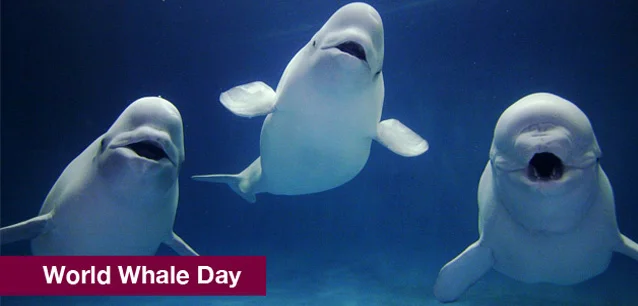 AD
AD
Today is: November 09
Scroll to explore events active on this date.
LEEP INK FEATURES

August? Absolutely!
In August, we live through the Dog Days of Summer. It's hot and often humid, and those who can leave for better climates do. Down south, winter is in full force. August is also known as "the ...

In The Heat of July: July 2025 Events
Is it hot enough (or cold enough if you're below the equator) for you yet? There is actually a day for that! Like every month, I pick a diverse collection of events you may or may not know about. This ...

May Blooms: Events in May 2025
Along with October, May is one of the most densely packed months of the year. It's before the summer humidity and the last whole month of the school year. The weather is warming in t...
About World Whale Day
Ends: Feb 18, 2024
DESCRIPTION:
World Whale Day is celebrated annually on the third Sunday of February, raising awareness about the majestic giants of the ocean and the need to protect them. Originating in Maui, Hawaii, the Pacific Whale Foundation established the day to honor and raise awareness for these magnificent creatures. The event started as part of the Maui Whale Festival, which has since grown into a global celebration.
Whales, ranging from the colossal blue whale to the acrobatic humpback, play a critical role in marine ecosystems. They contribute to the health of aquatic environments by maintaining stable food chains and even assist in combating climate change through their carbon sequestration activities. Despite their significance, many whale species face threats from human activities, including commercial whaling, ship strikes, entanglement in fishing gear, and pollution.
World Whale Day celebrates whales in their natural habitats and a call to action to protect them and their ocean home. Events on this day often include educational programs, conservation initiatives, beach clean-ups, and whale-watching excursions, all aimed at fostering a deeper connection between people and the marine environment.
The Pacific Whale Foundation and other conservation organizations use this day to highlight the importance of international cooperation in whale conservation efforts. They advocate for stronger protections for whales, including maintaining and strengthening international whaling bans, creating marine protected areas, and promoting sustainable practices to reduce ocean pollution.
As World Whale Day gains momentum each year, it underscores the ongoing commitment of conservationists, communities, and governments worldwide to ensure the survival of these spectacular marine mammals for future generations. The day reminds us of the beauty and importance of whales and the ongoing need to act diligently to protect them amidst the challenges they face.
Whales are fascinating creatures, broadly categorized into two main groups: baleen whales (Mysticeti) and toothed whales (Odontoceti).
Baleen Whales (Mysticeti)
These whales have baleen plates for filtering food from water rather than teeth.
Toothed Whales (Odontoceti)
These whales have teeth and are generally smaller than baleen whales. This group includes dolphins and porpoises as well, but focusing on the larger species:
These categories encompass a range of species, each with unique characteristics and habitats. The diversity among whale species is vast, each playing a crucial role in their respective ecosystems.
This event began in 1980.
VIDEOS
SUPPORTING DOCUMENTS
Currently, this event does not have supporting documents.
ADDITIONAL IMAGES
Currently, this event does not have supporting images.
Where would you like to go now?
 AD
AD


/footer-logo.svg)
